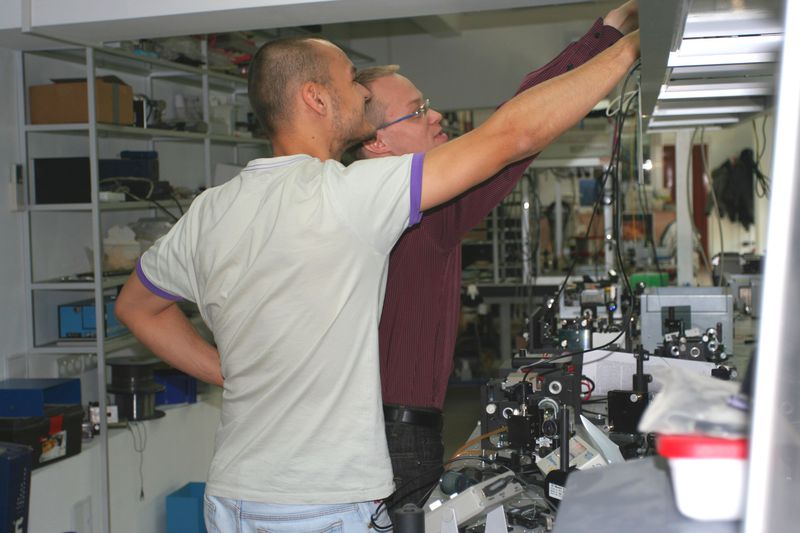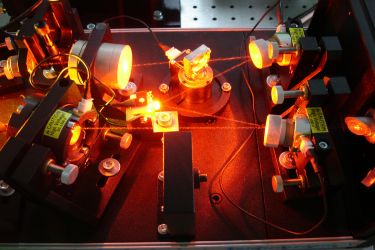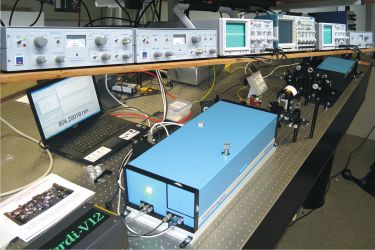What is science in Russia?
Recently, articles about the experience of getting an education and working abroad are popular on Habré; articles regularly showcasing the offices of IT companies . Such interest is clear. Many of us received elementary technical education and defended bachelor’s and master’s degrees at Russian universities and want to continue to develop. And obviously, one can only guess why then further research or work Habravchane prefer to lead abroad or in far from scientific companies. But is it any different?

To get acquainted with one non-typical Siberian laboratory-organization that for many years combines specialized training of students, research and international commercial activities, I ask for cat.
The discussion deals with the Department of Laser Physics and Innovative Technologies of the Novosibirsk State University. One of the research premises of the department is located right in the laboratory building of the NSU, about 100 meters from the dean's office of the physics department.
 Starting from the 3rd year, physics students can come to this laboratory for scientific practice. Gradually mastering the specifics of working with laser equipment under the guidance of senior colleagues, students are involved in the current work of the department and soon they independently carry out research in the field that most interests them. And to choose the direction of research is from what! Tunable solid-state lasers and dye lasers, frequency doublers of laser radiation, lasers for optical pumping are all huge areas of science in which each year large and small discoveries and achievements are made by teams of researchers all over the world. Each direction is represented in the laboratory in the form of real installations and laser complexes of its own design. And for research in the field of fiber optics, the laboratory already 10 years ago was allocated a separate room, which is also located in the NSU.
Starting from the 3rd year, physics students can come to this laboratory for scientific practice. Gradually mastering the specifics of working with laser equipment under the guidance of senior colleagues, students are involved in the current work of the department and soon they independently carry out research in the field that most interests them. And to choose the direction of research is from what! Tunable solid-state lasers and dye lasers, frequency doublers of laser radiation, lasers for optical pumping are all huge areas of science in which each year large and small discoveries and achievements are made by teams of researchers all over the world. Each direction is represented in the laboratory in the form of real installations and laser complexes of its own design. And for research in the field of fiber optics, the laboratory already 10 years ago was allocated a separate room, which is also located in the NSU.
')
The result of our usual scientific research are publications in journals, speeches at conferences and reports on grants. Similarly, this laboratory, founded more than 20 years ago, specialized in tunable lasers . But the development of the laboratory went further.
 From the very first years of work, working laser installations were created here. Soon, other laboratories began to receive offers to purchase these lasers. The fact is that tunable lasers are necessary for cooling atoms to low temperatures and for research in the field of spectroscopy. Thus, the development of a laboratory of laser systems was (and still is) the necessary equipment for the research of many laboratories. In the beginning of the transaction, it was possible to conclude on behalf of the university, but only within Russia. Foreigners were doubtful about the commercial relationship with the school. Therefore, in 1993, the company Tekhnoskan was registered to conduct international supplies of lasers. From the moment of registration, the CEO of the company is still the head of the “Department of Laser Physics and Innovative Technologies” Sergey Kobtsev.
From the very first years of work, working laser installations were created here. Soon, other laboratories began to receive offers to purchase these lasers. The fact is that tunable lasers are necessary for cooling atoms to low temperatures and for research in the field of spectroscopy. Thus, the development of a laboratory of laser systems was (and still is) the necessary equipment for the research of many laboratories. In the beginning of the transaction, it was possible to conclude on behalf of the university, but only within Russia. Foreigners were doubtful about the commercial relationship with the school. Therefore, in 1993, the company Tekhnoskan was registered to conduct international supplies of lasers. From the moment of registration, the CEO of the company is still the head of the “Department of Laser Physics and Innovative Technologies” Sergey Kobtsev.
 Now the laboratory has extensive experience, many developments and patents, as well as whole laser complexes developed over the past years right here. The high scientific significance of the laboratory is confirmed by many of the research grants won, which allows the laboratory to have equipment that is not inferior or even superior to European and American laboratories.
Now the laboratory has extensive experience, many developments and patents, as well as whole laser complexes developed over the past years right here. The high scientific significance of the laboratory is confirmed by many of the research grants won, which allows the laboratory to have equipment that is not inferior or even superior to European and American laboratories.
Along with the development and increase in the model range of the proposed laser systems, the range of technical problems and the required solutions is growing. In addition to the two laboratories in the NSU, another one already owned by the company is occupied by several people: designers, electronics engineers, and programmers. The first ones design adjusting heads for mirrors, various holders for optical elements, laser housings and much more “iron” necessary for the work of the laboratory and the company. Electronics engineers monthly collect all new and new boards for control units of lasers, constantly improving them, and programmers create software that allows the end user to control lasers from a computer, which removes the consumer from needing to be an expert in optics and change various parameters of laser radiation (for example, power, radiation wavelength, etc.) without touching its internal structure.
 The close intertwining of student practice, serious research and the design of real laser systems that are in demand both in Russia and abroad, allows young professionals to develop rapidly in professional terms. Moreover, the laboratory participates in some grants together with foreign universities and, for example, for the last two years, in the course of research in the field of high-energy fiber lasers with the University of Aston (UK) it is young professionals who spend several months a year working in the UK.
The close intertwining of student practice, serious research and the design of real laser systems that are in demand both in Russia and abroad, allows young professionals to develop rapidly in professional terms. Moreover, the laboratory participates in some grants together with foreign universities and, for example, for the last two years, in the course of research in the field of high-energy fiber lasers with the University of Aston (UK) it is young professionals who spend several months a year working in the UK.
The future of the laboratory seems interesting. The availability of free money from the sale of lasers allows you to engage in all the new developments of both laser systems and try yourself in new related areas.
And with what successful examples of scientific laboratories have you met?
PS Of course, with such a device, the lab also has its own difficulties, because the students, having defended themselves, still partially go to work in foreign companies or in completely different areas. But the availability of self-financing, albeit partial (grants remain a significant part of funding), is an important indicator of laboratory success and fundamentally changes attitudes towards work and science in general, fueling ambitions and involvement of young professionals in the development of science and high technologies without leaving our country .

To get acquainted with one non-typical Siberian laboratory-organization that for many years combines specialized training of students, research and international commercial activities, I ask for cat.
The discussion deals with the Department of Laser Physics and Innovative Technologies of the Novosibirsk State University. One of the research premises of the department is located right in the laboratory building of the NSU, about 100 meters from the dean's office of the physics department.
 Starting from the 3rd year, physics students can come to this laboratory for scientific practice. Gradually mastering the specifics of working with laser equipment under the guidance of senior colleagues, students are involved in the current work of the department and soon they independently carry out research in the field that most interests them. And to choose the direction of research is from what! Tunable solid-state lasers and dye lasers, frequency doublers of laser radiation, lasers for optical pumping are all huge areas of science in which each year large and small discoveries and achievements are made by teams of researchers all over the world. Each direction is represented in the laboratory in the form of real installations and laser complexes of its own design. And for research in the field of fiber optics, the laboratory already 10 years ago was allocated a separate room, which is also located in the NSU.
Starting from the 3rd year, physics students can come to this laboratory for scientific practice. Gradually mastering the specifics of working with laser equipment under the guidance of senior colleagues, students are involved in the current work of the department and soon they independently carry out research in the field that most interests them. And to choose the direction of research is from what! Tunable solid-state lasers and dye lasers, frequency doublers of laser radiation, lasers for optical pumping are all huge areas of science in which each year large and small discoveries and achievements are made by teams of researchers all over the world. Each direction is represented in the laboratory in the form of real installations and laser complexes of its own design. And for research in the field of fiber optics, the laboratory already 10 years ago was allocated a separate room, which is also located in the NSU.')
The result of our usual scientific research are publications in journals, speeches at conferences and reports on grants. Similarly, this laboratory, founded more than 20 years ago, specialized in tunable lasers . But the development of the laboratory went further.
 From the very first years of work, working laser installations were created here. Soon, other laboratories began to receive offers to purchase these lasers. The fact is that tunable lasers are necessary for cooling atoms to low temperatures and for research in the field of spectroscopy. Thus, the development of a laboratory of laser systems was (and still is) the necessary equipment for the research of many laboratories. In the beginning of the transaction, it was possible to conclude on behalf of the university, but only within Russia. Foreigners were doubtful about the commercial relationship with the school. Therefore, in 1993, the company Tekhnoskan was registered to conduct international supplies of lasers. From the moment of registration, the CEO of the company is still the head of the “Department of Laser Physics and Innovative Technologies” Sergey Kobtsev.
From the very first years of work, working laser installations were created here. Soon, other laboratories began to receive offers to purchase these lasers. The fact is that tunable lasers are necessary for cooling atoms to low temperatures and for research in the field of spectroscopy. Thus, the development of a laboratory of laser systems was (and still is) the necessary equipment for the research of many laboratories. In the beginning of the transaction, it was possible to conclude on behalf of the university, but only within Russia. Foreigners were doubtful about the commercial relationship with the school. Therefore, in 1993, the company Tekhnoskan was registered to conduct international supplies of lasers. From the moment of registration, the CEO of the company is still the head of the “Department of Laser Physics and Innovative Technologies” Sergey Kobtsev.Sergei Kobtsev himself with a smile recalls the incident he came to the laboratory:
“I graduated from NSU in 1982. When I was in my last year (on the fifth - then I studied at FF for five years), Boris Vladimirovich Bondarev, whom I knew from the Kvant humor club, turned to me - he was then the ex-president of the club, and I was an active member of the club. “Do you want to work in my lab?” He asked. “I want to,” I replied. - "And who else works for you?" - "So far, no one," said Boris Vladimirovich. “You will be the first employee, and I will be the leader.” “Quantans in quantum optics” - so they wrote about us in the newspaper. ”
 Now the laboratory has extensive experience, many developments and patents, as well as whole laser complexes developed over the past years right here. The high scientific significance of the laboratory is confirmed by many of the research grants won, which allows the laboratory to have equipment that is not inferior or even superior to European and American laboratories.
Now the laboratory has extensive experience, many developments and patents, as well as whole laser complexes developed over the past years right here. The high scientific significance of the laboratory is confirmed by many of the research grants won, which allows the laboratory to have equipment that is not inferior or even superior to European and American laboratories.Along with the development and increase in the model range of the proposed laser systems, the range of technical problems and the required solutions is growing. In addition to the two laboratories in the NSU, another one already owned by the company is occupied by several people: designers, electronics engineers, and programmers. The first ones design adjusting heads for mirrors, various holders for optical elements, laser housings and much more “iron” necessary for the work of the laboratory and the company. Electronics engineers monthly collect all new and new boards for control units of lasers, constantly improving them, and programmers create software that allows the end user to control lasers from a computer, which removes the consumer from needing to be an expert in optics and change various parameters of laser radiation (for example, power, radiation wavelength, etc.) without touching its internal structure.
 The close intertwining of student practice, serious research and the design of real laser systems that are in demand both in Russia and abroad, allows young professionals to develop rapidly in professional terms. Moreover, the laboratory participates in some grants together with foreign universities and, for example, for the last two years, in the course of research in the field of high-energy fiber lasers with the University of Aston (UK) it is young professionals who spend several months a year working in the UK.
The close intertwining of student practice, serious research and the design of real laser systems that are in demand both in Russia and abroad, allows young professionals to develop rapidly in professional terms. Moreover, the laboratory participates in some grants together with foreign universities and, for example, for the last two years, in the course of research in the field of high-energy fiber lasers with the University of Aston (UK) it is young professionals who spend several months a year working in the UK.The future of the laboratory seems interesting. The availability of free money from the sale of lasers allows you to engage in all the new developments of both laser systems and try yourself in new related areas.
And with what successful examples of scientific laboratories have you met?
PS Of course, with such a device, the lab also has its own difficulties, because the students, having defended themselves, still partially go to work in foreign companies or in completely different areas. But the availability of self-financing, albeit partial (grants remain a significant part of funding), is an important indicator of laboratory success and fundamentally changes attitudes towards work and science in general, fueling ambitions and involvement of young professionals in the development of science and high technologies without leaving our country .
Source: https://habr.com/ru/post/157049/
All Articles